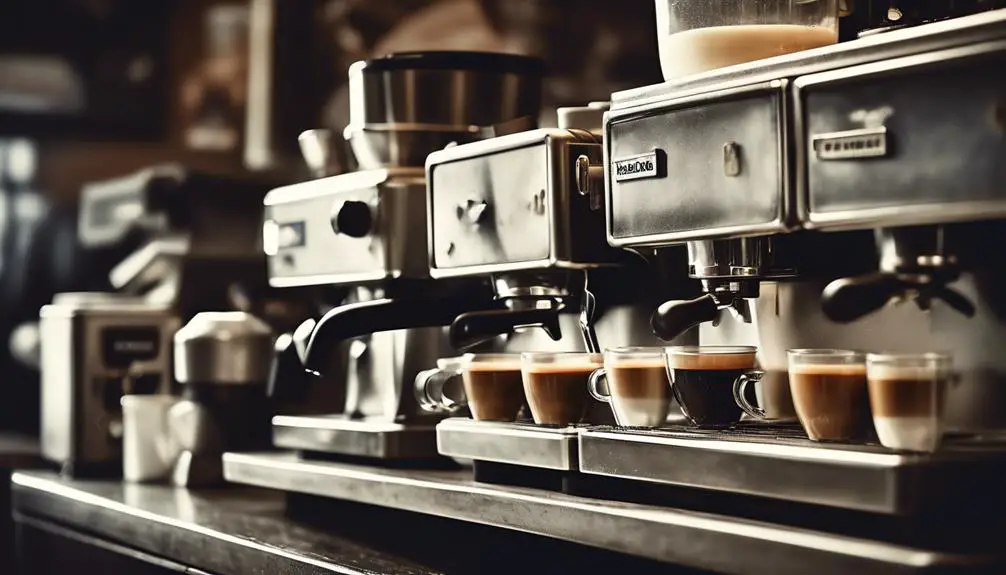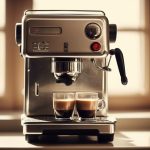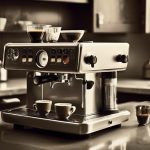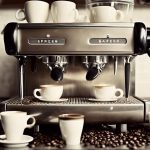Last Updated on: 2nd January 2024, 03:20 pm
Are you tired of dull and lackluster espresso? Are you craving a cup of rich, flavorful goodness to start your day? Look no further than water-filtered espresso machines. These marvels of modern technology will revolutionize your coffee experience.
But with so many types, how do you know which is right for you? Fear not, for we have compiled 13 expert tips to guide you through the world of water-filtered espresso machine types. From understanding the importance of water quality to troubleshooting common issues, we’ve got you covered.
So please grab a cup of your favorite brew and dive into the world of water-filtered espresso machines together.
TLDR
- Water-filtered espresso machines improve the taste and quality of espresso by providing a cleaner and more balanced flavor profile.
- Water filters in espresso machines prevent mineral buildup and scale formation, reducing the need for frequent descaling and maintenance.
- Using filtered water in espresso machines is cost-effective in the long run, extending the machine’s lifespan and ensuring consistent brewing results.
- Understanding the importance of water quality in espresso brewing is crucial, as it directly affects the taste, aroma, and overall quality.
Benefits of Water-Filtered Espresso Machines
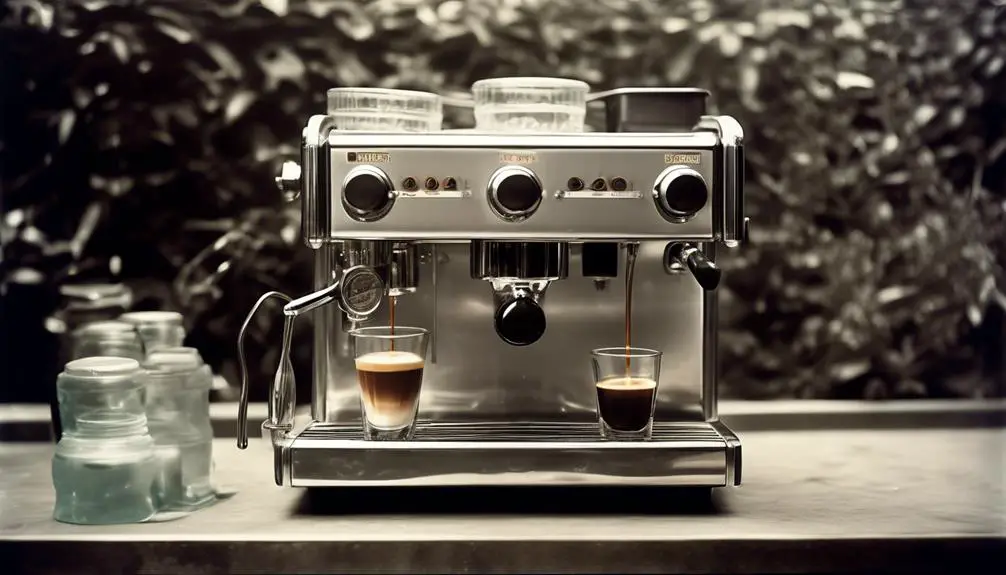
One major benefit of using water-filtered espresso machines is the improved taste and quality. When you use a water-filtered espresso machine, you ensure that the water used to brew your espresso is free from impurities and contaminants. This results in a cleaner and more balanced flavor profile, allowing you to enjoy the nuances of your coffee fully.
Additionally, using filtered water in espresso machines helps to prevent mineral buildup and scale formation, which can negatively impact the performance and lifespan of your machine. By reducing the need for frequent descaling and maintenance, water-filtered espresso machines aren’t only convenient and cost-effective in the long run.
Types of Espresso Machines With Water Filters
Several types of espresso machines incorporate water filters into their design. These machines are designed to provide you with the benefits of filtered water, ensuring the best quality espresso every time.
One type of espresso machine with a water filter is the built-in filter espresso machine. This machine has a water reservoir with a built-in filter that removes impurities from the water before brewing your espresso.
Another type is the espresso machine with a detachable water filter. These machines come with a separate water filter that can be easily removed and replaced for regular maintenance. By regularly replacing the water filter, you can ensure that your espresso machine continues producing high-quality espresso using filtered water.
Proper water filter maintenance is essential for the longevity and performance of your espresso machine.
Key Features to Consider in Water Filtered Espresso Machines

When considering water-filtered espresso machines, it’s important to assess the key features that will enhance your brewing experience.
One crucial factor to consider is the machine’s ability to handle different water hardness levels. Water hardness refers to the concentration of minerals, such as calcium and magnesium, in the water. High levels of hardness can affect the taste of your espresso and the machine’s overall performance. Look for a machine with adjustable settings to accommodate different water hardness levels, ensuring you can achieve the perfect balance of flavors in your espresso.
Additionally, consider the ease of water filter maintenance. Regular maintenance and filter replacement are essential to keep your machine functioning optimally and ensure the quality of your brew. Look for a machine that offers easy access to the water filter and provides clear instructions for maintenance and replacement.
Understanding the Importance of Water Quality in Espresso Brewing
To achieve consistent brewing results, it’s crucial to understand the impact of water quality in espresso brewing. The quality of water used directly affects the taste, aroma, and overall quality of the espresso.
Factors such as hardness, mineral content, and pH level can significantly influence the coffee’s extraction process and flavor profile. You can maintain brewing consistency and enhance the overall espresso experience by ensuring high-quality water.
Water Quality Impact
Water quality plays a crucial role in the precision and flavor of your espresso brewing experience. To ensure optimal results, it’s important to consider the impact of water quality on your espresso machine. Here are some key factors to keep in mind:
- Brewing Temperature: Water quality directly affects the temperature at which your espresso is brewed. Impurities in the water can lead to inconsistent temperature levels, resulting in under-extracted or over-extracted espresso shots.
- Water Hardness: Hard water, which contains high levels of minerals such as calcium and magnesium, can cause scale buildup in your espresso machine. This can lead to clogged pipes and decreased performance over time.
- Taste: Water quality can significantly impact the taste of your espresso. Impurities in the water can alter the flavor profile, resulting in a less enjoyable brewing experience.
- Machine Longevity: Using filtered water can help extend the lifespan of your espresso machine by reducing the buildup of minerals and scale.
- Consistency: Consistent water quality ensures consistent brewing results, allowing you always to perfect your espresso recipe and achieve the desired flavor.
Brewing Consistency
Considering the impact of water quality on your espresso machine, achieving brewing consistency is essential for a precise and flavorful espresso brewing experience. The consistency of your espresso depends on various factors, including brewing techniques and grind size.
Brewing techniques play a crucial role in determining your espresso’s strength, taste, and quality. Different brewing techniques, such as espresso, ristretto, or lungo, require specific parameters to ensure consistency. It’s important to master these techniques and follow them consistently to achieve the desired results.
Additionally, the grind size of your coffee beans plays a significant role in brewing consistency. The grind size affects the extraction process, determining the balance between bitterness and acidity in your espresso. Experimenting with different grind sizes and finding the optimal one for your machine can greatly enhance your espresso’s brewing consistency and overall flavor.
Comparing Different Water Filtration Systems for Espresso Machines
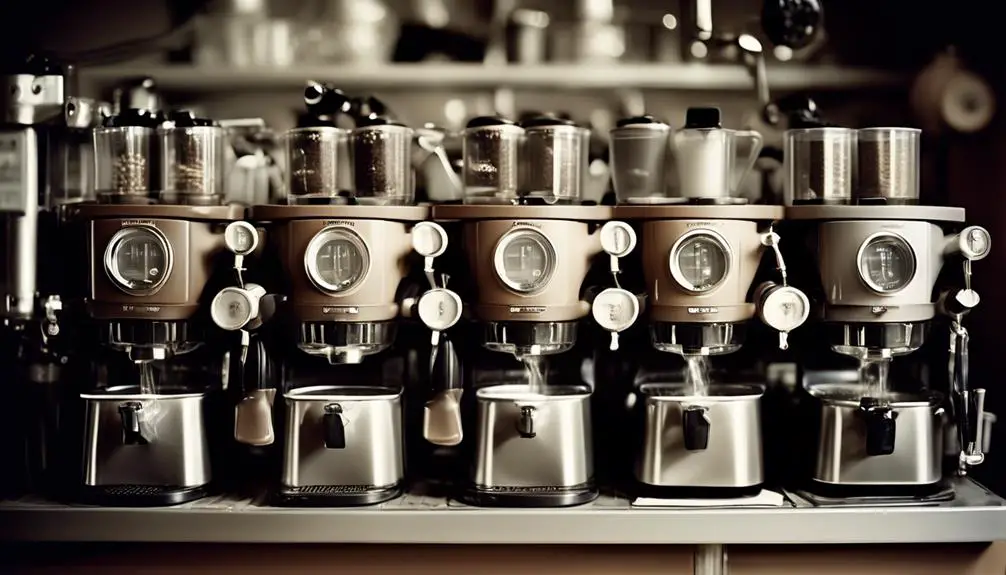
Now let’s compare the different water filtration systems available for espresso machines.
Various filters can be used, including activated carbon filters, reverse osmosis systems, and water softeners.
Each of these systems has its advantages and disadvantages, and it’s important to understand their differences to decide which one is best suited for your espresso brewing needs.
Types of Filters
One essential aspect to consider when selecting an espresso machine is the filter used for water filtration systems. The filter material is crucial in the water quality used to brew your espresso. Here are some types of filters commonly used in espresso machines:
- Activated Carbon Filters: These filters use activated carbon to remove impurities and improve the taste of the water. Regular maintenance is required to replace the carbon periodically.
- Ion Exchange Filters: These filters use resin beads to remove minerals from the water, preventing scale buildup in the espresso machine. The resin beads need to be regenerated or replaced regularly.
- Reverse Osmosis Filters: These filters use a semipermeable membrane to remove contaminants and minerals from the water. They require regular maintenance to clean or replace the membrane.
- Ceramic Filters: These filters trap sediments and impurities using a porous ceramic material. They need to be cleaned regularly to maintain their effectiveness.
- Magnetic Filters: These filters use magnets to alter the properties of water molecules, reducing scale buildup and improving taste. They require minimal maintenance.
Selecting the right filter for your espresso machine will ensure the water you use is of the highest quality, resulting in a better-tasting espresso and a longer lifespan for your machine. Remember to maintain and replace the filter regularly to keep your espresso machine in optimal condition.
Filtration System Comparison
To compare different water filtration systems for espresso machines, it’s important to understand each type of filter’s unique features and benefits. The effectiveness of a filtration system plays a crucial role in the overall quality of the espresso taste.
Various types of filters are available, each with advantages and drawbacks. Some filters use activated carbon to remove impurities from the water, while others utilize a combination of ceramic and ion-exchange resins to achieve optimal filtration.
The filtration system’s effectiveness can be measured by its ability to remove contaminants like chlorine, sediment, and heavy metals. Additionally, the impact on espresso taste can vary based on the filtration system. Some filters may enhance the flavor profile by removing unpleasant tastes and odors, while others may not have a noticeable effect.
It’s important to consider these factors when choosing a water filtration system for your espresso machine to ensure a consistently delicious cup of coffee.
Pros and Cons of Built-in Water Filters in Espresso Machines
Built-in water filters in espresso machines offer several advantages and disadvantages that should be considered before purchasing.
Advantages:
- Effectiveness: Water filters greatly improve the taste and quality of your espresso by removing impurities and minerals that can affect the flavor.
- Machine lifespan: Water filters can extend the lifespan of your machine by preventing the buildup of limescale and other deposits.
Disadvantages:
- Maintenance and replacement: Water filters require regular maintenance and replacement, which can add to the overall cost and inconvenience.
- Flow rate and pressure: Depending on the type of filter used, it may impact the flow rate and pressure of the machine, potentially affecting the consistency and quality of your espresso.
- Effectiveness compared to standalone filtration systems: Built-in water filters may not be as effective as standalone water filtration systems. So, if water quality is a major concern for you, it may be worth investing in a separate water filtration system.
How to Maintain and Clean Water Filters in Espresso Machines
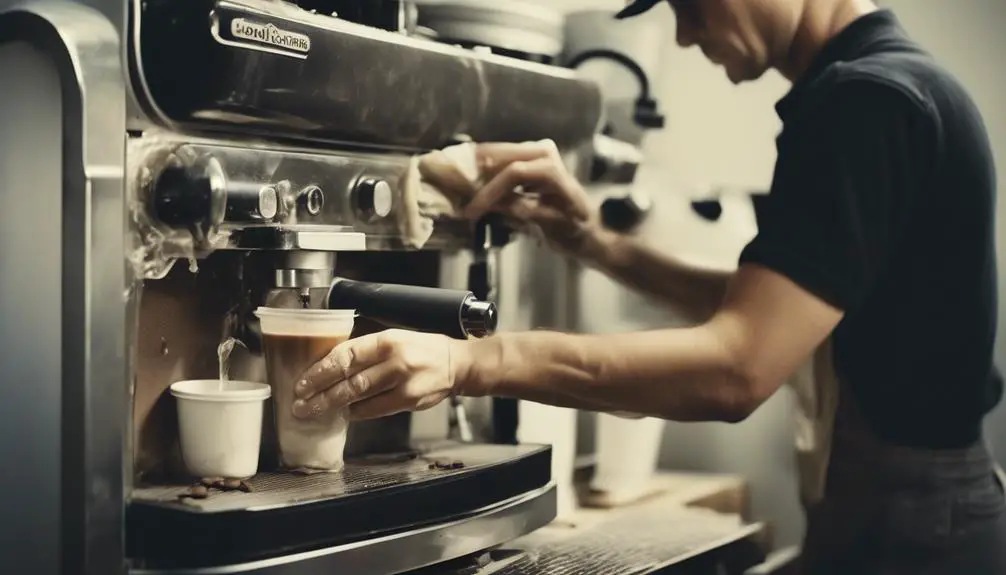
Regular maintenance and cleaning of water filters in espresso machines is crucial to ensure optimal performance and longevity of your machine.
One important aspect of maintenance is descaling the water filters. Over time, mineral deposits can build up in the filters, affecting the taste and quality of your espresso.
Remove the filter from the machine and rinse it thoroughly with warm water to descale the water filters. Then, prepare a descaling solution according to the manufacturer’s instructions and soak the filter in the solution for the recommended time.
After soaking, rinse the filter with clean water to remove any residual solution.
Additionally, suppose you encounter any issues with your water filter, such as reduced water flow or strange taste. In that case, troubleshooting steps can include checking for clogs, replacing the filter, or adjusting the water pressure.
Exploring the Technology Behind Water Filtered Espresso Machines
Water-filtered espresso machines employ advanced technology to ensure the highest quality and best-tasting espresso. These machines utilize water filtration technology advancements to enhance the brewing process and improve the overall flavor profile of the espresso.
Here are some key aspects of the technology behind water-filtered espresso machines:
- Water Filtration System: These machines are equipped with advanced water filtration systems that remove impurities, such as chlorine, minerals, and sediments, from the water. This ensures a clean and pure water supply for brewing espresso.
- Temperature Control: Water temperature is crucial in extracting flavors from coffee grounds. Water-filtered espresso machines have precise temperature control mechanisms that maintain the ideal brewing temperature, usually around 195 to 205 degrees Fahrenheit.
- Consistency: These machines are designed to deliver consistent water quality and temperature, resulting in consistent espresso extraction and flavor.
- Pressure Regulation: Water-filtered espresso machines feature regulation mechanisms that ensure optimal extraction pressure during brewing. This helps to extract the maximum flavor from the coffee grounds.
- Customization Options: Many water-filtered espresso machines offer customization options, allowing users to adjust water temperature and pressure to suit their preferred brewing style.
Tips for Choosing the Right Water Filtered Espresso Machine for Your Needs
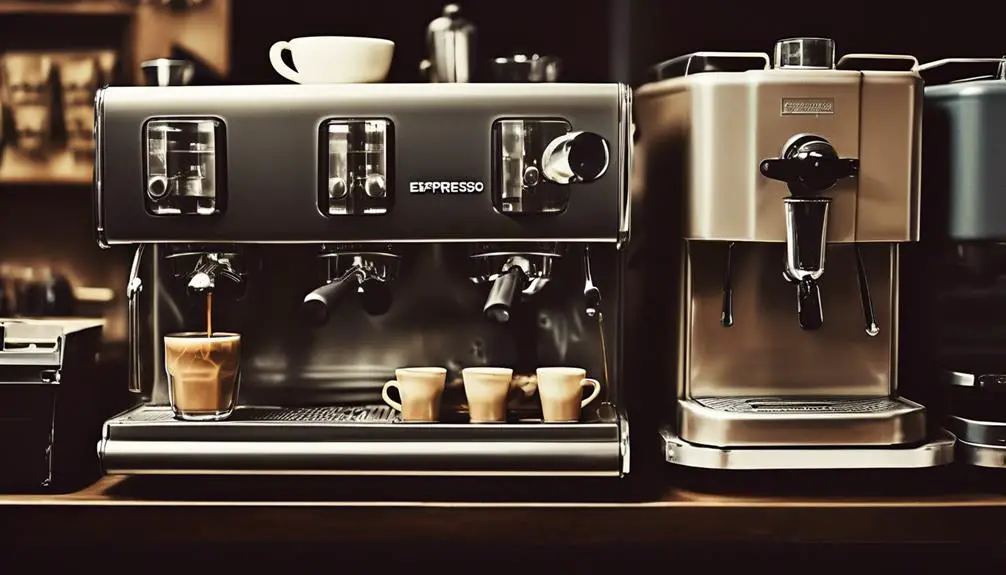
When choosing a water filtered espresso machine, there are three key points: machine features and specifications, water filtration system options, and budget considerations.
First, evaluate the machine’s features and specifications, such as the brewing capacity, programmable settings, and the type of filters it uses.
Next, explore the different water filtration system options, such as activated carbon filters or reverse osmosis systems, to ensure the highest water quality for your espresso.
Lastly, factor in your budget and find a machine that meets your needs without breaking the bank.
Machine Features and Specifications
To ensure optimal performance and meet your specific needs, consider the following machine features and specifications when choosing a water filtered espresso machine:
- Water Filter System: Look for a machine with a built-in water filter system. This will help remove impurities from the water, ensuring a better-tasting espresso and prolonging the lifespan of your machine.
- Adjustable Brew Strength: The ability to adjust the brew strength is important as it allows you to customize your espresso according to your preference.
- Programmable Settings: Look for machines with programmable settings such as temperature control, pre-infusion, and shot volume. This allows you to have more control over the brewing process.
- Easy Maintenance: Consider machines that are easy to clean and maintain. Look for features like removable brew groups, automatic cleaning cycles, and descaling programs.
- Water Quality Testing: Some machines come with water quality testing kits or built-in sensors that can measure the hardness of your water. This information is important as it helps determine the frequency of descaling and maintenance required.
Water Filtration System Options
Consider the importance of the water filtration system when selecting the right water filtered espresso machine for your specific needs.
The type of filtration system used in your espresso machine can greatly affect the taste and quality of your espresso.
There are several filtration system types available, each with its benefits.
One option is a carbon filter, which helps remove impurities and odors from the water, resulting in a cleaner and more flavorful espresso.
Another option is a reverse osmosis system, which removes minerals and contaminants, ensuring that only pure water is used during brewing.
Using filtered water in your espresso machine can provide numerous benefits, including improved taste, reduced scaling and mineral buildup, and increased machine longevity.
Budget Considerations
To select the right water filtered espresso machine for your specific needs while staying within your budget, carefully evaluate the features and performance of different options. Consider the following factors when making your decision:
- Water filter brands: Look for machines that use reputable brands like Brita or Mavea. These brands are known for their quality and effectiveness in removing impurities from water.
- Factors affecting water filter effectiveness: Understand the factors that can impact the effectiveness of water filters, such as water hardness and the presence of specific contaminants. Choose a machine that addresses these factors adequately.
- Cost of replacement filters: Consider the cost when considering the overall budget. Some machines may require frequent filter changes, which can add to the long-term expenses.
- Machine maintenance: Consider the ease of maintenance and cleaning required by different machines. Opt for models that offer simple and cost-effective maintenance options.
- Warranty and customer support: Look for machines with a warranty and reliable customer support. This ensures that any issues or concerns can be addressed promptly and efficiently.
Common Mistakes to Avoid When Using Water Filtered Espresso Machines

One common mistake when using water-filtered espresso machines is neglecting to properly clean and maintain the filter system. This oversight can lead to various issues and affect the quality of your espresso. Over time, minerals and impurities from the water can build up in the filter, resulting in clogs and reduced water flow. To prevent this, it’s essential to regularly clean and descale the filter system according to the manufacturer’s instructions.
Another common mistake is using the wrong type of water. Hard water with high mineral content can cause scale buildup, affecting the machine’s performance. It’s recommended to use filtered or distilled water to prevent these issues.
Failing to replace the filter cartridges at the recommended intervals can also impact the taste and quality of your espresso.
Enhancing the Flavor of Espresso With Water Filtered Machines
To enhance the flavor of your espresso, a water-filtered machine ensures that impurities and minerals are effectively removed from the water, resulting in a cleaner, more vibrant taste.
Here are some tips to enhance the flavor of your espresso with water-filtered machines:
- Consistent water quality: Filtered water provides a consistent quality, ensuring that your espresso tastes the same every time.
- Improved extraction: By eliminating impurities, filtered water allows for better extraction of the coffee’s flavors, resulting in a more balanced and enjoyable cup of espresso.
- Retained aroma: Filtered water preserves the natural aroma of the coffee, enhancing the overall sensory experience.
- Prolonged machine lifespan: By preventing the buildup of mineral deposits, filtered water helps extend the lifespan of your espresso machine, ensuring optimal performance for longer.
- Health benefits: Water quality testing and filtration remove harmful contaminants, making your espresso safer.
Troubleshooting Common Issues With Water Filtered Espresso Machines
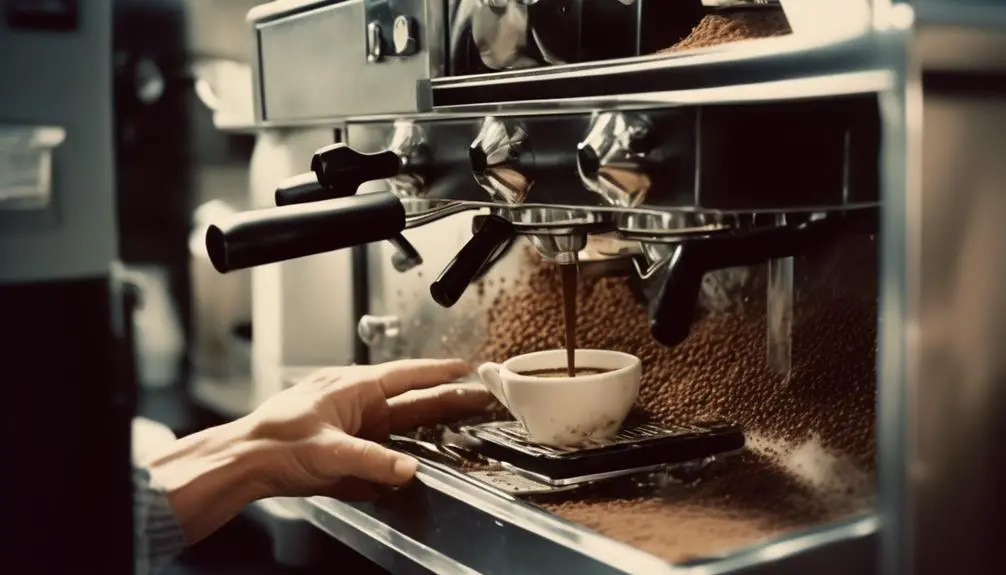
If you encounter issues with your water filtered espresso machine, there are several troubleshooting steps you can take to identify and resolve the problem.
First, check if the machine is properly plugged in and turned on. Sometimes, a loose connection or power outage can cause issues.
Next, ensure that the water reservoir is filled to the appropriate level. Insufficient water can lead to poor performance or even damage to the machine.
Additionally, check if the filter is clean and free from debris. A clogged filter can affect the water flow, resulting in weak or bitter-tasting espresso.
Lastly, regular maintenance is key to preventing problems. Clean the machine regularly, descale as needed, and follow the manufacturer’s recommended maintenance tips.
Expert Advice on Getting the Most Out of Water Filtered Espresso Machines
When optimizing the performance of your water filtered espresso machine, expert advice can help you achieve the best results. Here are some tips to help you get the most out of your machine:
- Regular water filter maintenance: Clean and replace the filter according to the manufacturer’s instructions to ensure optimal filtration and prevent clogging issues.
- Use the right water temperature: Ensure the water temperature is within the recommended range for brewing espresso. Too hot or too cold water can affect the taste and quality of your espresso.
- Properly grind your coffee: Adjust the grind size according to your machine’s specifications to achieve the perfect extraction and avoid any issues with water flow.
- Clean and descale regularly: Regular cleaning and descaling of your machine will prevent any build-up of mineral deposits that can affect the performance of your water filter.
- Troubleshoot water filtration issues: If you notice any problems with water flow or taste, consult the user manual or contact customer support for assistance in troubleshooting and resolving any water filtration issues.
Frequently Asked Questions
Can a Water Filtered Espresso Machine Be Used With Unfiltered Water?
Yes, you can use an espresso machine with unfiltered water, but it is recommended to use filtered water for the best results. Using filtered water in an espresso machine provides benefits such as improved taste and reduced mineral buildup.
Are All Types of Espresso Machines Compatible With Water Filters?
Not all types of espresso machines are compatible with water filters. It is important to consider the benefits of using a water filter for your espresso machine, as water quality greatly affects the taste and quality of your espresso.
Do Water Filtered Espresso Machines Require Any Special Maintenance?
Water filtered espresso machines do require special maintenance to ensure optimal performance. Regularly cleaning and replacing the water filter is necessary. The benefits of using filtered water include improved taste and protection against mineral buildup.
Can Water Filters Improve the Taste of Espresso?
Water filters can greatly improve the taste of your espresso. Removing impurities and minerals enhances the flavor profile, resulting in a smoother and more enjoyable cup of coffee. The benefits of water filtration are undeniable.
What Are Some Common Issues That Can Occur With Water Filtered Espresso Machines?
Common problems with water filtered espresso machines include clogged filters, low water pressure, and inconsistent water temperature. Troubleshooting tips for these issues may involve cleaning or replacing filters, checking pump settings, and calibrating the temperature control.
Conclusion
In conclusion, water filtered espresso machines offer numerous benefits for coffee enthusiasts. Understanding the importance of water quality and choosing the right filtration system can greatly enhance espresso’s flavor and brewing process.
By avoiding common mistakes and following expert advice, users can maximize the performance and longevity of their water filtered espresso machines.
So, invest in a quality machine with a water filter and enjoy a delicious cup of espresso every time.

Mike Shaw
Mike is a fervent aficionado of all things coffee. His journey has taken him from the verdant coffee farms of South America to the vibrant coffeehouses of Europe and many places in between. Over the years, he's delved deep into the intricate tapestry of coffee, savoring, brewing, and analyzing myriad varieties. For Mike, coffee transcends its role as a morning energizer; it's a world waiting to be explored and cherished.

